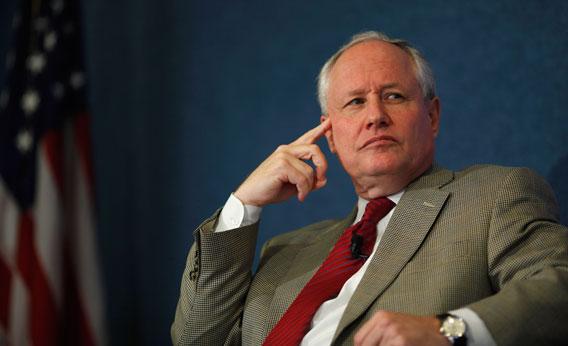Is that the best Bill Kristol can do? Kristol, the Fox News commentator, founder of the Weekly Standard, and instigator of much of President George W. Bush’s foreign policy, is behind the “Emergency Committee for Israel,” an entity that’s leveling cheap, base, and demagogic attacks on those supporting Occupy Wall Street .
ECI is running a television ad on cable news networks and YouTube featuring President Obama, House Minority Leader Nancy Pelosi, and me making statements supportive of OWS. My view, just to be clear, is that OWS has focused our attention on numerous economic issues that had somehow been lost because of the recent, single-minded focus on deficit reduction. The issues of joblessness, poverty, the growing plight of the middle class, and the inequitable distribution of wealth had all been essentially ignored. Several decades of misguided libertarian/neo-con policies bred not only the economic cataclysm of 2007-08 but also equally damaging long-term social problems.
But ECI says supporting Occupy Wall Street is to support “hate.” Try that again? By splicing hate-filled anti-Semitic statements that may or may not come from individuals hanging out on the fringe of the Zuccotti Park protests together with Nancy Pelosi’s, President Obama’s, and my supportive statements, ECI and Bill Kristol are trying to argue that Occupy Wall Street equals Obama and Pelosi equals anti-Semitism. They’re insinuating that support for OWS is the same as support for hate. (Former NYC Mayor Ed Koch—a recent ally of Kristol on Israel issues—has also written supportively of OWS: Why doesn’t he appear in the ad?)
What Kristol and ECI are doing is the oldest and cheapest game played by those who have nothing to say that actually responds to the real issues. They try to change the topic. And in this case, they don’t just try to change the topic, they do so in a way that attributes venomous and heinous views to those with whom they disagree. To associate sentiments such as those shown in the ECI ad with President Obama and Nancy Pelosi (or me) ought to be beneath even Bill Kristol.
So why are they using such tactics? Because they really can’t confront head-on the concerns articulated by OWS and shared by a significant percentage of the population: the concerns that our social contract is broken, that we bailed out the wrong folks and got nothing back, and that we are now being told by a self-satisfied and enriched plutocracy that the crisis is past. OWS supporters know something is wrong when banks have been bailed out but mortgage reform is still not being embraced meaningfully by the administration; when corporate profits are at a record level but joblessness is stagnating at 17 percent of the population; and when median family income has fallen 6.7 percent in just the past two years even as CEO compensation is reaching near-historic levels. These are complex issues: Addressing them head on in a serious way, as supporters of OWS want to do, is admirable and necessary. (To see a powerful presentation showing the demographic and economic shifts over the past several decades that have caused this growing frustration, visit Henry Blodget’s Business Insider.)
When the Tea Party rallies attracted tens of thousands of well-meaning individuals, but also some cranks on the fringe of society, I didn’t attribute to the Tea Party the worst ideas of the crazies drawn to the crowd. Just the opposite. Although I made it very clear I disagreed deeply with almost all of the statements from the Tea Party groups, I actually celebrated the outpouring of grassroots activism that generated such passion. I did not try to tarnish an entire movement by associating it with the heinous language of fringe groups attracted to it.
The problem for the neocons is that the pillars of their worldview—lower taxes and less regulation—have failed the test that matters: reality. Recent history has left their intellectual worldview as relevant as the astronomy that preceded Galileo. The actual historical impact of their policies is such that given a choice between defending their record and changing the topic—well, the choice for them is clear.
OWS has provided a critical spark igniting a much-overdue conversation about issues that had for too long been ignored in the corridors of power. Does OWS need to define a next step? Yes, it does. Does it attract, as does every gathering, fringe groups that should be isolated, ignored, and condemned? Yes, it does. But is supporting OWS the right thing to do? Absolutely.
